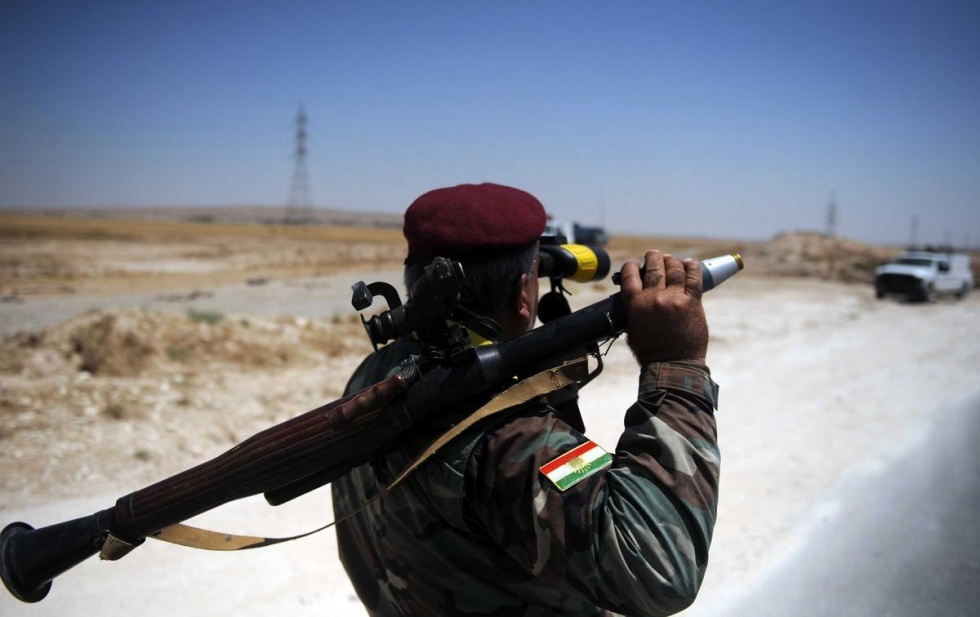Iran relies on Kurds to degrade Islamic State

As the United States-led coalition continues to target the Islamic State in Iraq and the Levant (ISIL) - also known as the Islamic State (IS) or ISIS - in both Iraq and Syria, Iran is operating its own parallel campaign against IS and its allies.
By contrast to the US-led campaign, Iran’s approach is characterised by capacity-building on the ground and manipulating local actors to confront IS and the layers of Sunni Arab discontent from which IS and its allies draw strength.
Above all, Iran wishes to see the Kurds, both in Iraq and Syria, get more embroiled in the fight against the Sunni militants, a dynamic that has intensified in recent months.
Deeper Kurdish involvement satisfies two key immediate Iranian objectives. First, keeping in check Kurdish aspirations for statehood and second, decreasing the military burden on Iran’s natural allies on the ground, namely the Shiite militias and the embattled governments in Baghdad and Damascus.
Delaying Kurdish statehood
Arguably, the most important strategic effect of IS’s lightening offensive in Iraq in early June (resulting in the capture of Mosul) and subsequent takeover of most of north-western and western Iraq has been to lend immediacy to the Kurdish aspiration for statehood. This position became formal policy in early July, when Massoud Barzani, the president of the autonomous Kurdish region in Iraq, declared his intention to organise an independence referendum.
Iran, like the United States and other key actors in the region, was surprised by the speed and depth of the IS offensive. Iran’s immediate instinctive reaction to the militant incursion was to rush aid and support to the Baghdad government and the assortment of Shiite militias allied to the Islamic Republic.
The intense focus on securing Baghdad and preventing a sweeping collapse in morale amongst the Shiite militias inevitably led to a decrease of Iranian intelligence and political influence operations in the northern Kurdish regions. Nevertheless, despite the loss of focus on the north, there were credible reports of Iran gifting weapons and equipment to both Kurdish factions (Barzani’s Kurdistan Democratic Party and the rival Patriotic Union of Kurdistan) to help them stem an IS-led offensive in August.
On the issue of Kurdish statehood, Iran will be using its dominant position on the ground and its network of allies and supporters to influence the process with a view to thwarting maximalist Kurdish ambitions. Failing that it plans to at the very least delay the outcome to a time more favourable to the Islamic Republic.
It is in this context that the intensifying Kurdish confrontation with IS – supported and encouraged by the Kurds’ Western backers – fits in with the Iranian strategic calculus. By fighting IS, the Kurds inevitably come into confrontation with a wide range of belligerent actors and constituencies which form the deeper layers of Sunni Arab revolt across Iraq.
Hitherto the Shiite Arabs firmly allied to Iran have borne the full force of the military and political confrontation with Iraq’s beleaguered Sunni Arab community. This has raised the cost of Iran’s domination of Iraq’s political life and strategic future, a cost which the Islamic Republic hopes will be shared by the ambitious Kurdish elites in Irbil and Sulaymaniyah.
But there is, of course, a risk of miscalculation. Kurdish military and political confrontation with the restive Sunni Arabs runs the risks of galvanising the Kurdish community in Iraq and thus accelerating the drive toward independence. This prospect is reinforced by Western military and political support, underscored by Washington’s decisive intervention in August to prevent the fall of Irbil.
To mitigate this risk, Iran is hoping that the wider regional conflict - specifically the intensifying conflict in Kurdish-majority regions of north-eastern Syria - will consume Kurdish energies and integrate them into the existing informal regional security architecture, as opposed to making a premature dash for statehood.
Managing regional conflicts
Based on the strategic rationale set out in this article, Iran surely welcomes the Iraqi Kurds’ intervention in the mini-conflict between the PKK-linked Syrian Kurds and IS, currently centred on the besieged town of Kobane.
The Iraqi Kurdish Peshmerga’s entry into Kobane not only adds yet another layer to the dizzyingly complex proxy war in Syria, but more importantly, from Iran’s point of view, it forces the Iraqi Kurdish leadership to engage in regional security operations. The Islamic Republic will be hoping that the effort and cost attached to this engagement complicate and decelerate the Kurdish drive toward full statehood.
On a broader strategic plane, the intensifying Kurdish-IS mini-war in north-central and north-eastern regions of Syria is undoubtedly welcomed by the government in Damascus and its patrons in Tehran. In immediate terms, this mini-conflict relieves pressure on Damascus and in potential terms it may fragment the armed groups even further thus strengthening Damascus’ hand in negotiating local ceasefires or even peace deals with isolated and exhausted belligerents.
Even at the deepest strategic, tactical and operational levels the Iraqi Kurdish involvement in the region’s civil wars and proxy conflicts is in line with Tehran’s long-term strategic calculus.
The Islamic Republic does not foresee a complete resolution to the conflicts in Iraq and Syria. Instead it envisages a complex web of low-intensity wars and frozen conflicts for at least a generation. This relatively contained chaos enables Iran to galvanise Shiite communities and other natural allies across the region with a view to securing strategic, political and economic advantage over enemies and opponents.
Whilst the Kurdish leadership, both in the form of the PKK and the KDP, are not Iran’s natural allies, nonetheless they are unwittingly complicit in Tehran’s strategic plans. In the final analysis, the Islamic Republic cannot prevent the realisation of Kurdish statehood, but it can do much to delay and manipulate the inevitable outcome to suit Iranian interests.
- Mahan Abedin is an analyst of Iranian politics. He is the director of the research group Dysart Consulting.
The views expressed in this article belong to the author and do not necessarily reflect the editorial policy of Middle East Eye.
Photo Credit: Iraqi Kurdish Peshmerga fighters have become key players in the fight against IS (AA)
New MEE newsletter: Jerusalem Dispatch
Sign up to get the latest insights and analysis on Israel-Palestine, alongside Turkey Unpacked and other MEE newsletters
Middle East Eye delivers independent and unrivalled coverage and analysis of the Middle East, North Africa and beyond. To learn more about republishing this content and the associated fees, please fill out this form. More about MEE can be found here.


